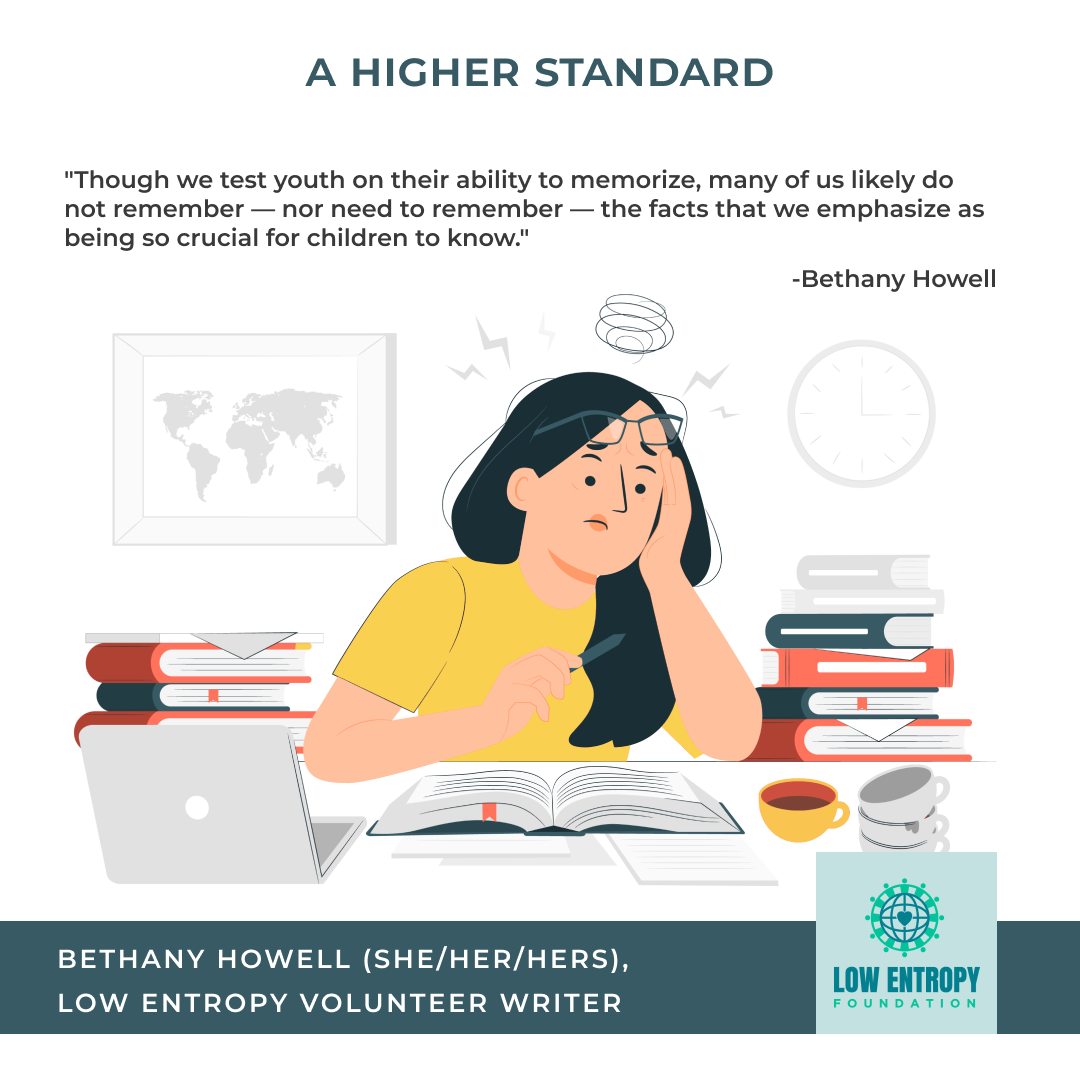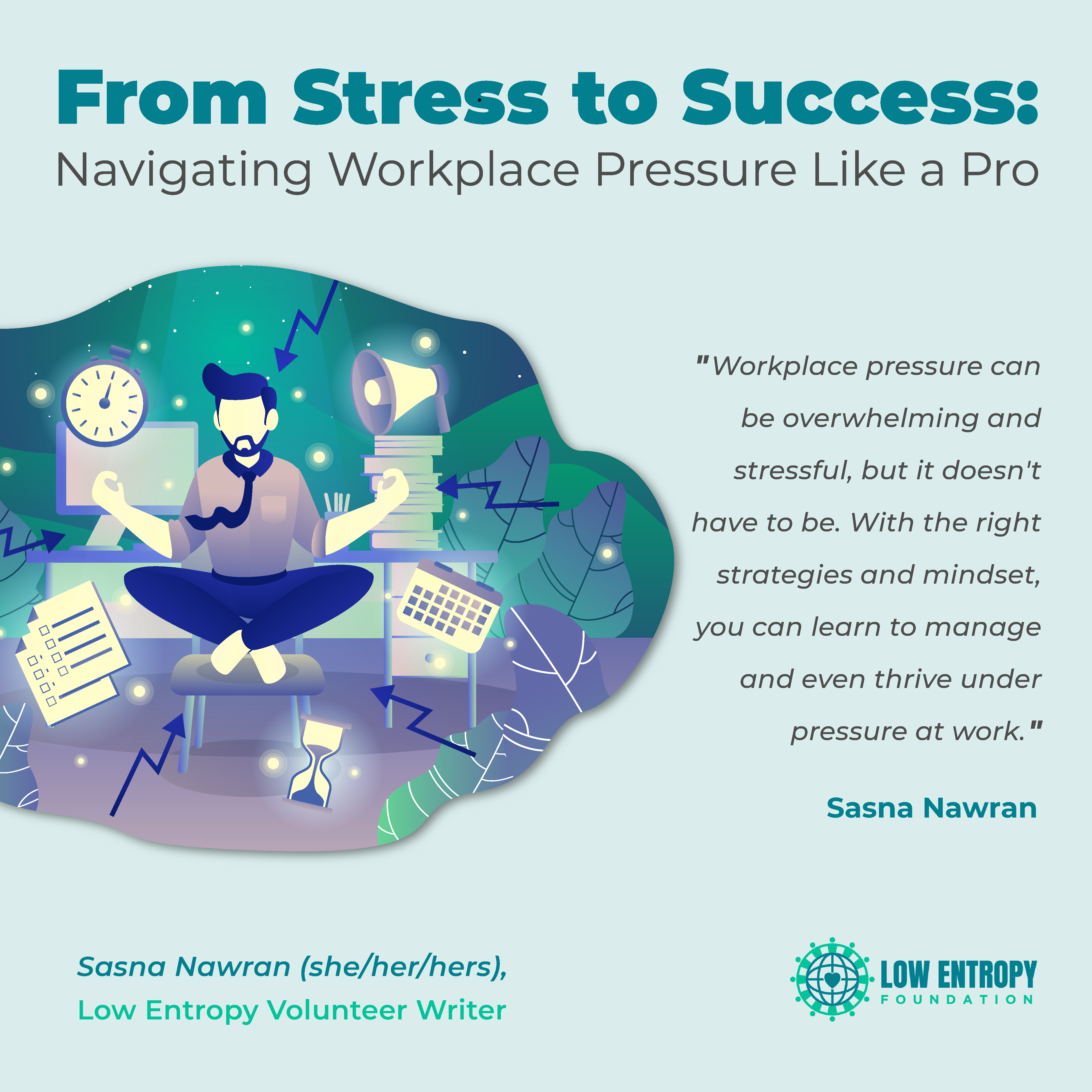A Higher Standard
August 19, 2023

Bethany Howell (she/her/hers), Low Entropy Volunteer Writer
I sit with a student to whom I have been assigned who must reach a certain level of reading before the “big test” at the end of the month. Another student that I work with, who seems to me to be perfectly capable of all skills tested, fails her final exam, despite my best efforts. Though I have been taught throughout my life that testing is a crucial part of education, I begin to question whether it is truly a reliable measure of students’ understanding, knowledge and success in academics and beyond.
Through completing my undergraduate degree in psychology and child development with multiple courses focused solely on education, I have found that modern research does not line up with the current educational practice of standardized testing. In other words, testing in education may not be as effective as we once thought.
Decades of research has produced mixed reviews as to whether standardized assessments such as literacy exams are the best way to evaluate a student’s abilities. Though they may be effective for some, many students do not perform well under the intense pressure and high anxiety levels of standardized testing environments. It is my belief that this level of pressure is not only unreasonable, but also makes education inaccessible for many students. As has been seen in the cases of at-risk students and diverse populations, standardized testing seems to benefit students that can afford such luxuries as individual tutoring and leave other students behind. Families that do not have the time, space or funds to enroll their children in educational supports are at a severe disadvantage when it comes to mass testing, leading to further pressure for these children to perform well. Due to this, the numbers of at-risk students who perform well on standardized tests are much lower than the numbers of students actually able to grasp and use the knowledge they have been given. Students who are prone to anxiety or require special accommodations are also at further disadvantage due to the stressful mental and overwhelming sensory experience of mass testing.
Much of standardized testing relies on rote memorization ability, as opposed to actual practical applications of knowledge. The statement I heard so much as a child comes to mind — “You will not always have a calculator in your back pocket.” Obviously, in this day and age, we do. Most, if not all of us, carry a powerful calculator, search engine, and database of almost all information throughout human history in our pockets. Indeed, you are likely viewing this article on such a device! Smartphones have not only revolutionized the way we live, but also how we view knowledge. Memorization of facts is no longer a valuable skill, as a quick Google search can be completed in under 30 seconds to find any formula, definition or date. Though we test youth on their ability to memorize, many of us likely do not remember — nor need to remember — the facts that we emphasize as being so crucial for children to know. Similarly, very few of us will ever be put in scenarios where rote memorization is required in the modern workplace.
Due to all of the reasons listed above, many schools have begun turning away from the rote memorization required for mass testing in favour of more competency-based models, including projects or cumulative averages of past work completed. Other schools have adopted practical applications as a key way to measure student understanding. This revised form of education is what is recommended through the Universal Design for Learning — a practice I myself subscribe to when teaching students. The goal of the Universal Design for Learning (or UDL) is to make education accessible for all using current research in youth psychology. As someone who has studied child psychology and worked in education for years, I cannot help but to be drawn towards this model. The UDL framework has proven to be one of the most effective models to date for bridging the gap between at-risk and privileged youth. Using systems brought forth through the UDL system, I have been able to assist many students in not only surviving an education system built to exclude them, but also to thrive learning in their own way. Instead of forcing youth to perform in a standardized environment, I have found that most students simply need to be shown a way that works for them — a way that incorporates how they learn and what they want to know.
Altogether, though there is still plenty of research to be done about testing and its effects on modern students, I believe that it is no longer as necessary as it once was. Looking into the future, most current students will not require any of the rote memorization that we rely on to test ability. In 20 years’ time, I expect that wisdom, critical thinking and practical applications will be used to assess students, not their ability to perform well on a standardized test.
—
My name is Bethany Howell and I am a university graduate with a BAH in psychology focusing on families and children. I am now continuing my education through taking post-graduate studies in addiction and mental health and plan to go on to complete my master’s in psychotherapy. I have a passion for writing and it has been my goal since age 13 to make a difference through helping others.
GET INVOLVED
At Low Entropy, we believe changing the world starts with changing ourselves.
Founded in 2015, Low Entropy Facilitates conversations that encourage diversity and promote inclusivity.
We understand that life can be confusing at times. It can seem challenging and sometimes you may feel like no one really “gets you.” We offer an opportunity to connect with others who have the capacity to understand you.









